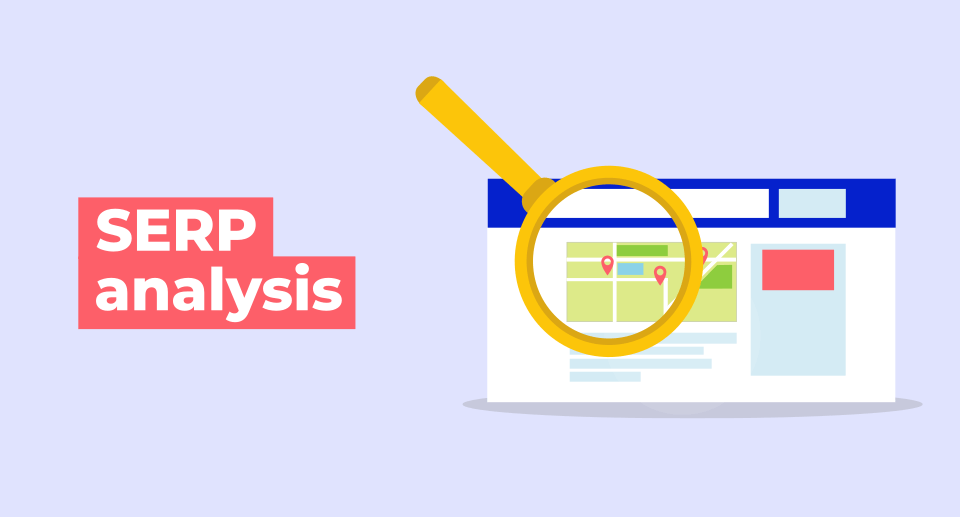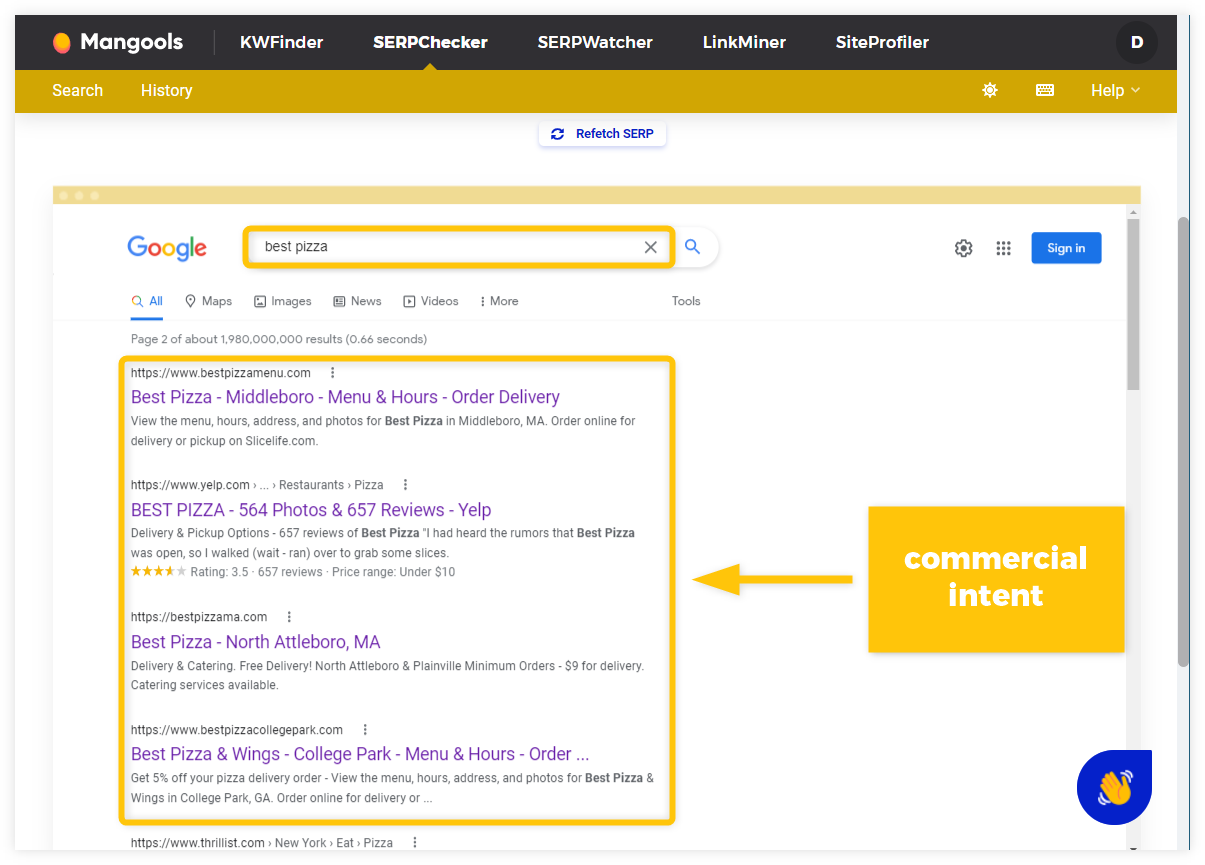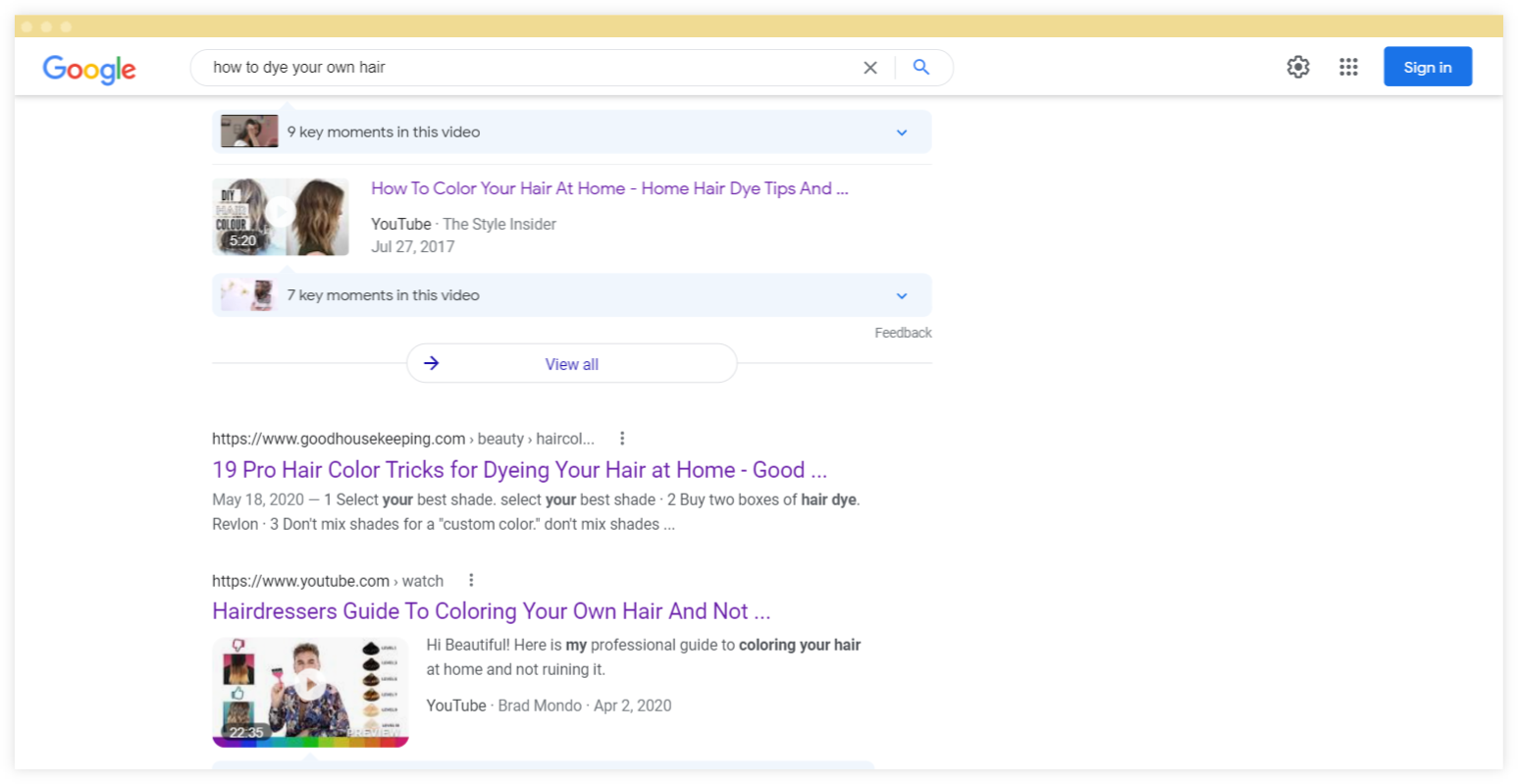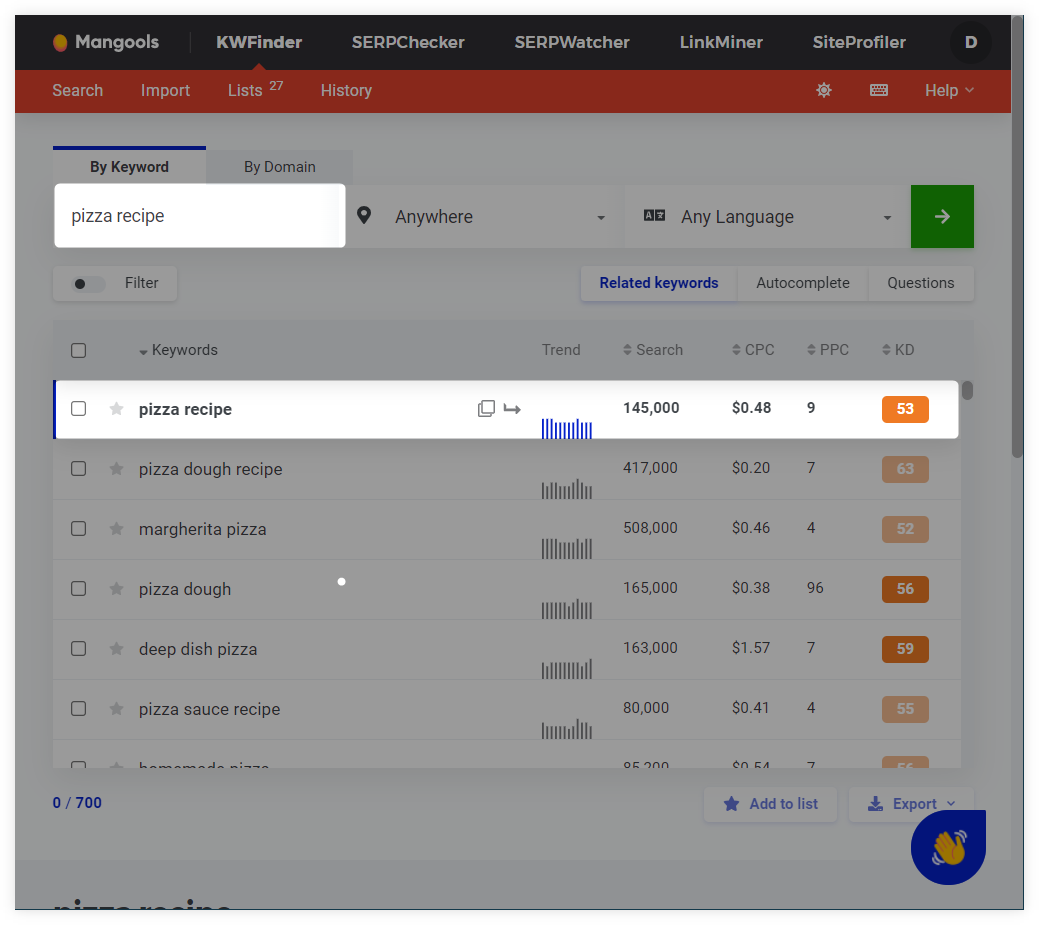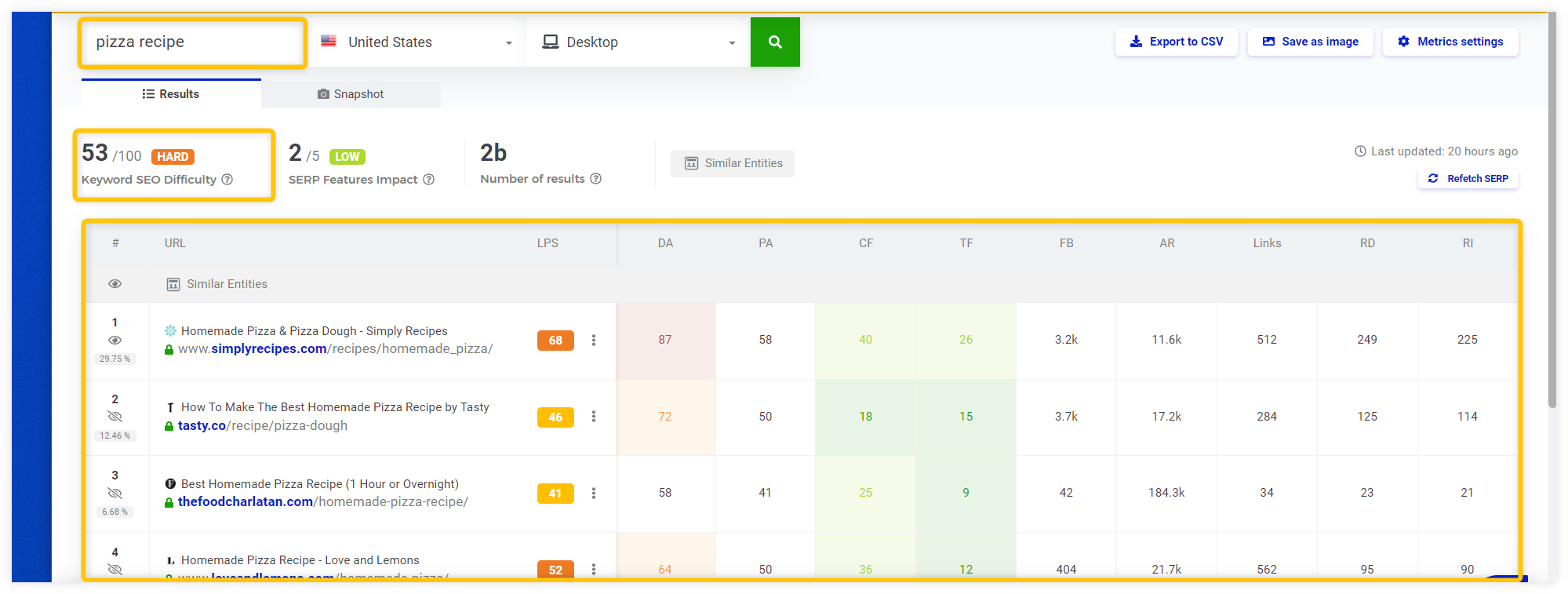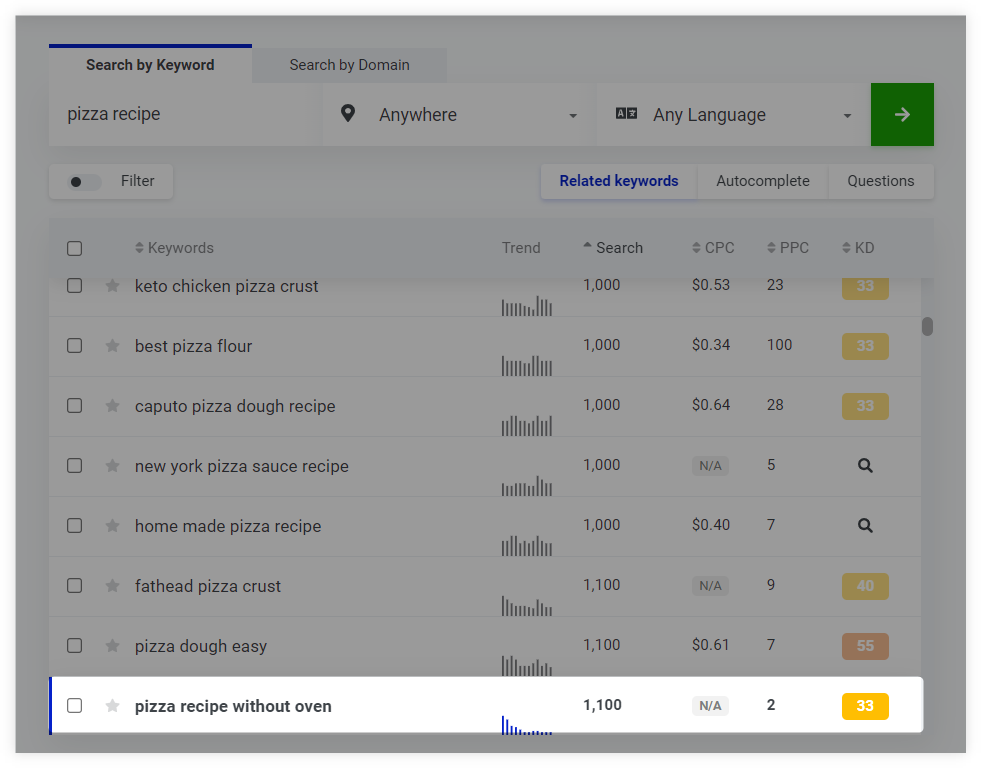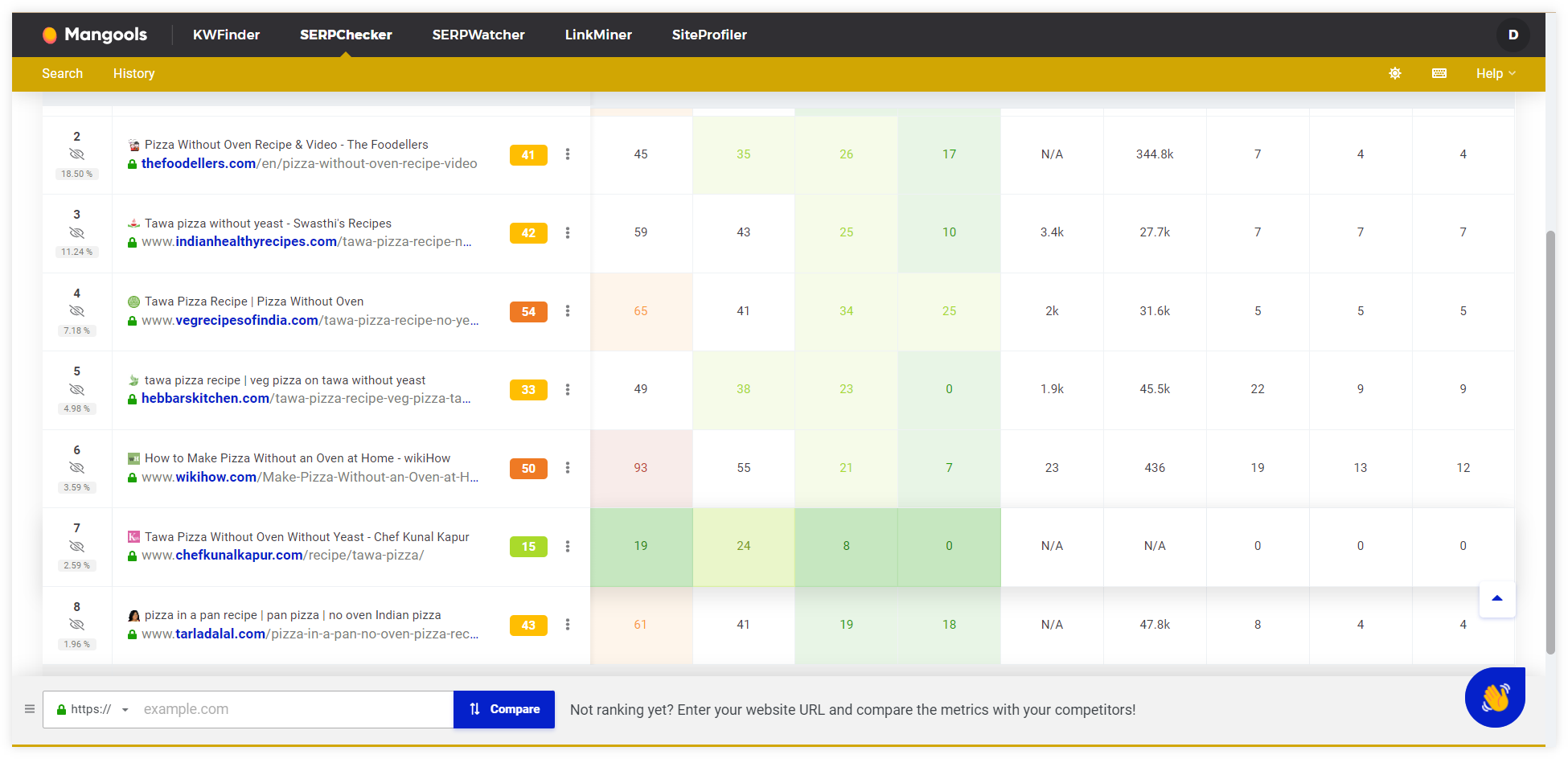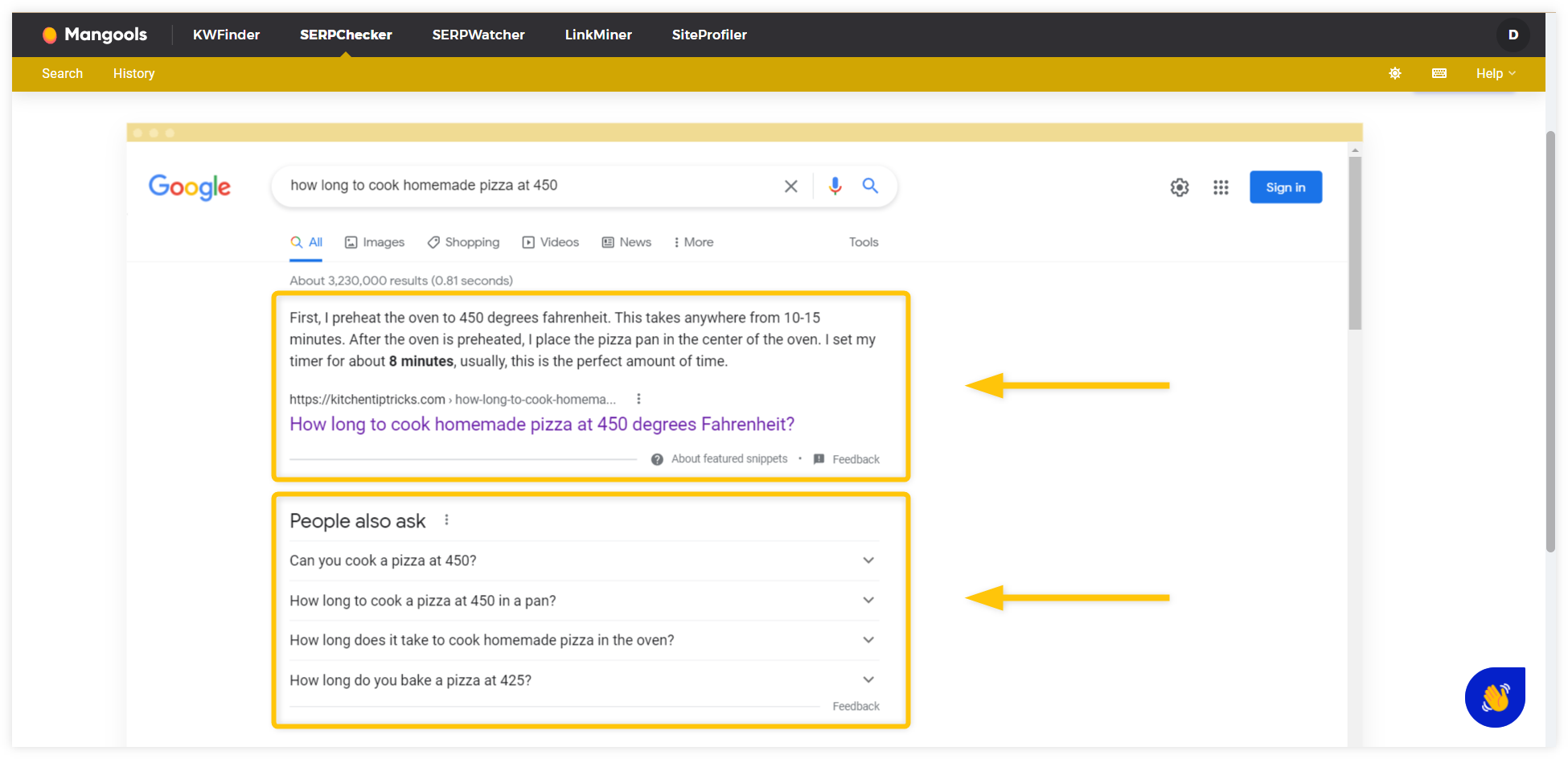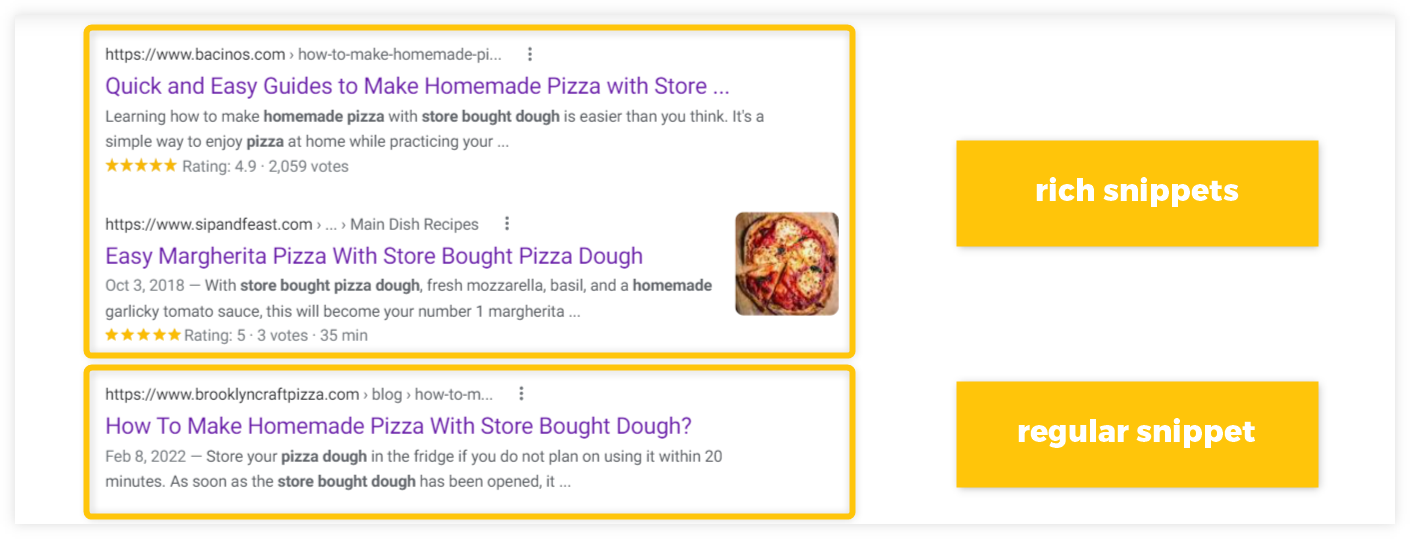Modern SEO is more than just keywords, backlinks, and technical stuff.
It requires a deeper understanding of the search engine, how it displays content in the SERP and why it prefers some websites over the others.
In this article, we will take a look at how you should perceive SERPs and how to use them to your advantage – by doing SERP analysis.
Are you ready? Let’s jump right into it.
What is SERP analysis?
SERP analysis is a process of looking at the top-ranking web pages in the SERP (Search Engine Results Page) in order to evaluate whether or not the particular keyword you want to rank for is relevant and to determine how hard it would be to outrank your competitors.
Why is SERP analysis important?
SERP analysis isn’t just about understanding keywords; it also helps ensure your content is aligned with user expectations. Since 94% of users form first impressions based on the design and relevance of a website, understanding which SERP features to target (e.g., featured snippets, People Also Ask boxes) is critical for visibility.
1. Check keyword relevancy
SERP analysis provides more detail about the keyword and their relevance for your niche or business.
It can easily happen that a keyword that seems to be super-relevant for you will end up as a wrong option because it’s not semantically correct or the search intent behind the query does not match the content that you want to provide.
2. Determine ranking difficulty
Besides the relevancy of the keyword, SERP analysis will also show you how difficult it would be to rank at the top of the SERP.
Whenever you find a relevant SERP that you would like to rank for, you need to evaluate how strong the competitors are based on several factors and metrics.
In order to obtain these data about the particular SERP, you need to use SEO tools like KWFinder and SERPChecker that will help you gather various information such as:
- Domain authority, Page authority
- Citation flow, Trust flow
- Number of external backlinks
- Link Profile Strength
These metrics can provide you with a rough estimate of the “strength” of your competitors and your ability to outrank them with your content.
3. Find ranking opportunities
Besides the keyword relevance and difficulty, SERP analysis can also help you find ways to get to the top of the search results faster.
Depending on the particular SERP, you can find various opportunities that you can use for the optimization of your content (e.g. People Also Ask boxes, featured snippets, etc).
How to do SERP analysis?
1. Perform keyword research
Before you start with the SERP analysis, you need to perform keyword research first and create a list of relevant keywords for your niche.
You can use tools like KWFinder to start with your keyword research – simply type a few seed keywords into the tool and start analyzing related keywords, long-tail keywords, and suggestions that are popular and relevant for your business.
You can quickly check the exact search volume and the keyword difficulty to evaluate how important every keyword is for you and get a deeper understanding of the topics that people are searching for.
Note: If you are new to keyword research or want to have a better understanding of how to conduct one, make sure you check out our ultimate guide to keyword research for beginners.
2. Determine the search intent
Once you gather all keywords that might be important for you, it is time to analyze their SERPs and find out whether or not they are relevant to your website.
The relevancy of the keyword can be determined by the search intent behind it.
Some of the keywords might seem to be topically relevant but they will not be relevant in terms of the intent that the user is typing them into Google Search,
The search intent can be divided into the 4 basic categories:
- Navigational intent – the user is looking for a particular website or a brand
- Informational intent – the user is looking for some information about something
- Transactional intent – the user would like to buy some product or service
- Commercial intent – the user would like to research a product first before buying it
The brief analysis of the SERP will help you to uncover the intent behind the keyword so you can decide whether or not the particular query is relevant for you.
For example, let’s say that you have a small blogging website about various pizza recipes and you would like to write an informational blog post about your favorite pizza recipe that the readers should try at home.
During your keyword research, you came across the keyword “best pizza” – it has a nice search volume so it could be worth optimizing your new blog post for it (just imagine the title “The best pizza in the world that you should definitely try!”, right?)
However, if we take a look at the SERP with SERPChecker, we will immediately see the problem with this keyword – the search intent does not match the informational one for your blog post.
Although the keyword is topically relevant for your niche (it is about pizza, right?), it does not show informational search results in the SERP – instead, it displays local pizza restaurants that the user can visit or order a pizza from.
We would never appear and rank for this keyword with our blog post because it does not match the commercial intent behind the query.
In this case, you should not try to optimize your page for this keyword and rather try a different one that will have informational intent behind it.
Pro tip: Besides the search intent behind the keyword, you should also pay attention to the type of content, that is ranking at the top of the SERP.
Even though you might find keywords that match the search intent for your pages, the displayed content might be somehow different from the one that you provide.
For example, the query “how to dye your own hair” has an informational intent but it displays different types of content – with youtube videos at the top of the SERP and step-by-step guides underneath them:
In this case, you might consider creating an informational video about hair dyeing if you want to appear at the top of the SERP or create an informational blog post that would rank below.
3. Analyze the competitors
The next step of the SERP analysis is to determine how hard it would be to beat the websites that are already ranking as the top search results in the particular SERP.
In order to perform competitive analysis, you need to use tools like SERPChecker to obtain the most detailed and accurate data about the ranking pages.
With SERPChecker, you can analyze the competitors and obtain valuable information such as:
- Keyword Difficulty
- Domain authority, Page authority
- Citation flow, Trust flow
- Number of external backlinks
- Link Profile Strength of each ranking page
- Average CTR of every ranking competitor in the SERP
You can use these SEO metrics and compare them with the metrics of your own website so you can get a better picture about the difficulty of getting on the top of the SERP.
Going back to our example with the website about pizza recipes, let’s take a look at the query “pizza recipe”.
If we take a look at this query in our keyword finder tool, we can clearly say that it is a very important keyword for our blogging site – it has a huge amount of monthly searches and is extremely relevant for our niche.
However, if we take a closer look at it in the SERPChecker, we can see a big problem with this keyword – it has a very high Keyword Difficulty and the top 10 ranking websites have a very strong link profile and high score in other metrics.
If we would like to rank for this keyword, it would require a massive SEO strategy with a number of external links that would support our content and a high authority website that would be capable of beating the ranking competitors.
In our scenario with a small blog, it would be merely impossible (or at least extremely difficult) to optimize our content for this SERP.
Instead, we can try to analyze keywords that are not out of reach for us – let’s analyze the SERP of another keyword like “pizza recipe without oven”.
The keyword has a decent search volume and relatively low Keyword Difficulty:
If we take a look at the SERP, we can see that it would be much easier to optimize our content for it – some of the competitive websites have a very low Link Profile Strength, as well as DA/PA and CF/TF metrics.
Some of the websites do not even contain this keyword in their Title Tags or URLs!
In this case, we can try to create better content with proper optimization so we would have a much higher chance to rank high in this particular SERP.
Note: Don’t take the metrics as the only reason (not) to optimize for a particular keyword.
The metrics such as Link Profile Strength, Domain Authority, or CF/TF metrics can help you to get a rough estimate of the difficulty to rank for the particular query – however, it is always possible to rank in the top positions with low DA and/or without any backlinks.
4. Check the opportunities in the SERP
SERP analysis can also help you to find hidden opportunities that can get you to the top of the SERP and outrank your competitors much quicker.
Besides the organic search results, SERP may also contain paid ads and various SERP features – which you can inspect during your SERP analysis and use them to your advantage.
SERP features such as featured snippets, People Also Ask boxes, or “Related searches” at the bottom of the SERP can give you many useful ideas about what people search for and use them for optimization purposes that can help you rank for the SERP much faster.
For example, when we take a look at the SERP for the keyword “how long to cook homemade pizza at 450”, it contains not only organic search results but also a featured snippet along with the People Also Ask box:
You can optimize your content for these SERP features so your page could appear at the top of the SERP as one of these features.
Pro tip: During the SERP analysis, you should also pay attention to whether or not Google displays rich snippets for the particular query and optimize your page for them.
By implementing structured data (schema.org) to your pages, you can boost the visibility of your page and increase the chances that you would rank higher with your content.
For example, when we take a look at the long-tail keyword “pizza recipe premade dough”, we can clearly see that some of the top-ranking pages are optimizing their content for the rich snippets – but some of them also do not!
You can use this to your advantage and implement structured data to your page and get ahead of the competing websites that did not implement it yet!
5. Use the data for the optimization
Once you have analyzed the SERP and obtained the data about your competitors, you can use all the information to your advantage and optimize the content for the particular query.
There are many ways how to use the data from the SERP analysis in your SEO strategy:
- Focus on SERPs that you are capable to rank for
- Replicate competitor’s backlinks for your page
- Optimize content for SERP Features
- Implement structured data (if possible)
- Analyze the content of your competitors and create a better one
- Improve your Title Tag, meta description, URL and other useful HTML tags
- Get more content ideas from the Related Searches and People Also Ask boxes
With the data obtained from the SERP analysis, you can get a much better overview about the difficulty of the ranking for the particular SERP as well as obtain more ideas on how to optimize your content better than your competitors.
5. Track the SERPs
SERP analysis is a process that needs to be done regularly – you need to keep track of the SERPs that you are ranking for and react to changes that may appear in them.
Changes in SERPs can happen over time – whether it is a change in the ranking positions of your pages, appearance (or disappearance) of some SERP features, or even a change in the search intent for the SERP.
In order to keep track of these changes, you should use tools like SERPWatcher to be aware of any significant change that can happen over time.
In SERPWatcher, you can track the performance of your pages for particular keywords and check how they are doing in the SERPs over time.
If you already have a list of keywords that you would like to keep an eye on, you can simply import those into the tool and track the ranking positions of your pages for these keywords.
SERPWatcher also provides valuable information about the SERP changes such as:
- The current ranking position of your page for a particular keyword
- Change in rankings overtime in the SERP
- The overall performance of your website for your chosen keywords
- The appearance of your page in the form of a featured snippet
Tip: You can also use our free tool SERP Volatility Insight to quickly check whether the change in rankings is happening only to your website or whether it is happening on a global scale.
How to spot weaknesses on the SERP
Spotting weaknesses in the Search Engine Results Pages (SERP) can provide valuable opportunities to enhance your website’s visibility.
By identifying these vulnerabilities, you can strategically position your content to outperform competitors. Below are some key techniques to analyze and leverage the SERP effectively:
1. Title mismatch
One common weakness on the SERP is title mismatch. This occurs when the title tag of a webpage doesn’t accurately match the main heading (H1) of the page or does not reflect the topic, intent, or content itself.
Title mismatch can be a gap you can exploit by ensuring your titles are precise and engaging.
You can analyze the SERP for titles that don’t align well with the user’s search intent behind the search query and consider questions like:
- Are my titles overly generic and failing to capture the specific needs of searchers?
- Do any titles mislead about the content’s actual focus or promises?
- Are my titles and H1 headings the same or at least similar?
By crafting titles that accurately match the search intent and clarify the content’s purpose, you can attract more clicks and stand out among competitors with mismatched titles.
2. Include focus keywords
Another effective approach is ensuring that your webpage titles, headings, and meta descriptions include the focus keyword naturally and effectively.
Search engines and users alike prioritize relevance, and including the focus keyword can improve your page’s chances of ranking higher.
Here are the steps to identify this weakness:
- Perform a SERP analysis to see if competitors are under-utilizing essential keywords.
- Check if competitors are over-optimizing by stuffing keywords in ways that reduce content quality.
By strategically incorporating focus keywords into your title tags and meta descriptions, you can demonstrate relevance and enhance user experience, making your pages more competitive on the SERP.
3. Boost organic CTR with GSC and ChatGPT
This SERP technique is based on utilizing data from Google Search Console and processing it in ChatGPT to boost organic traffic in SERPs.
The idea behind this technique is pretty straightforward: if you already have some articles that are ranking high for certain keywords (but have a low click-through rate), you can maximize their organic CTR potential by optimizing and improving their titles for the keywords that are delivering the most traffic from Google Search.
To do this, you should:
- Go to your Google Search Console account and select the “Search results” tab.
- Turn on the “Total clicks,” “Average CTR,” and “Average position” in the performance chart at the top.
- Find pages that are performing well and copy all the URLs (along with their clicks, CTR, and position data) into a spreadsheet.
With all the data in one place, you can start comparing the CTR of your top-ranking pages with the average CTR that usually occurs in Google SERPs for given positions. Here are the average benchmarks for Google ranking positions. (source: https://www.wearetg.com/google-ctr-by-position/).
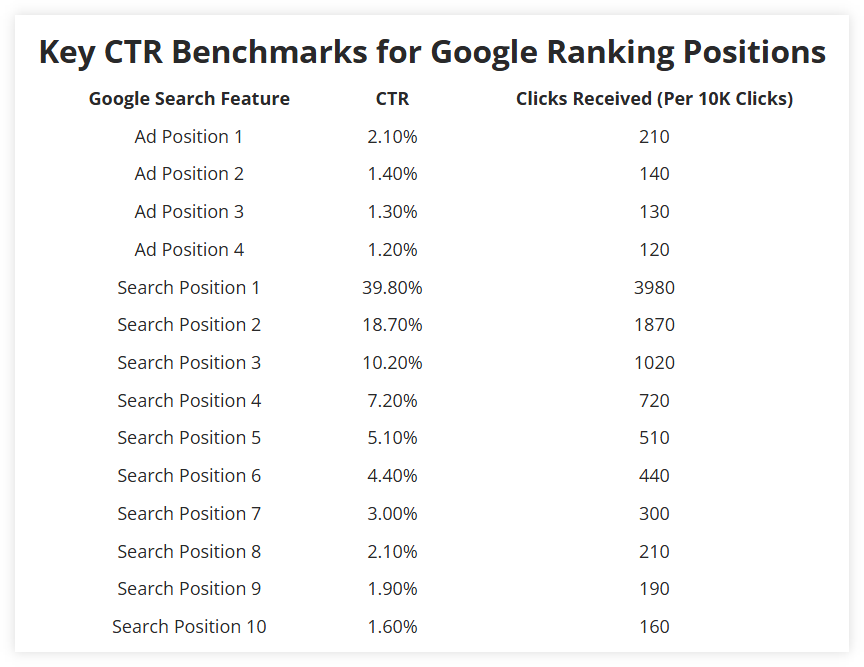
So, for example, if one of your pages is ranking for position #1 / #2 / #3, etc., but its average CTR is lower than the average click-through rate for pages at the given position, you can update its title tag to maximize its CTR.
This is where ChatGPT comes into play—you can utilize the AI tool to improve your existing title tags to create catchier titles that would attract more organic visitors to your pages.
Simply put your current title tag into ChatGPT and ask it to generate more interesting title alternatives that would result in higher CTR.
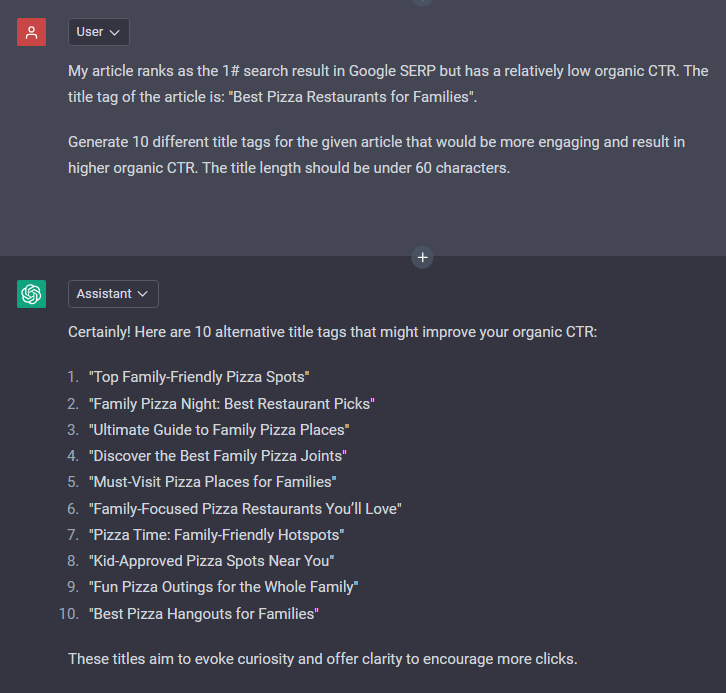
Once you pick your favorite, implement the new title on your web page and measure the results for about 1 – 3 weeks.


